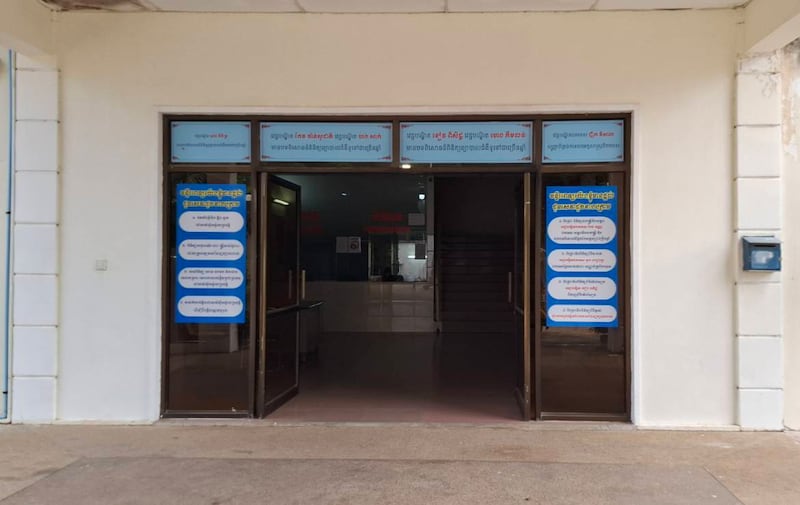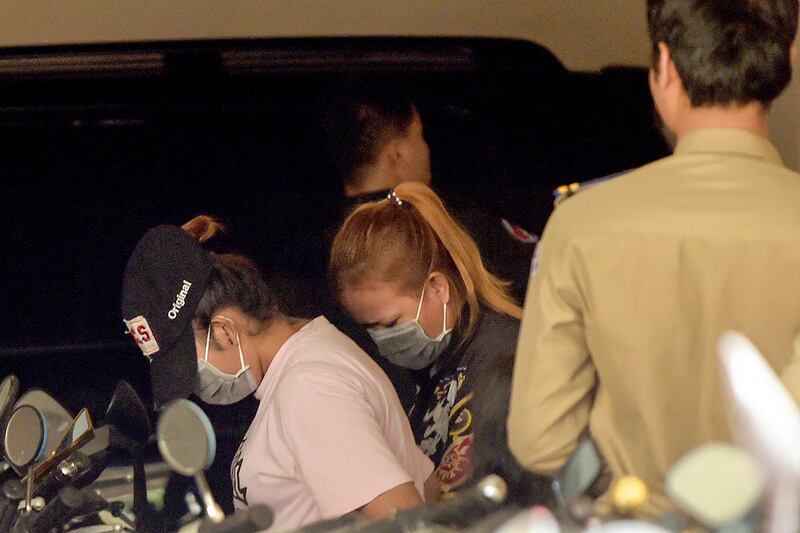A woman from the Philippines gave birth in Cambodia one day before being convicted of human trafficking for working as a commercial surrogate, RFA has learned, raising questions for what comes next for both mother and baby.
The woman is one of a group of 13 pregnant Filipina surrogates arrested in September and being kept under police supervision at a hospital in Phnom Penh.
Several are likely to deliver within weeks, and one among the group is carrying twins, RFA can reveal.
This is the first case of convictions for foreign women acting as commercial surrogates in Cambodia, hinting at a possible broader transnational operation.
RFA understands that the women are being kept in Phnom Penh’s 16 Ouksaphea Hospital, sharing rooms but not crowded in the airy public hospital.
The new mother, who gave birth on Dec. 1, has been able to stay with her baby boy so far, with no immediate plans to relocate her to a prison facility, RFA has learned.

The women are able to interact with each other within the hospital wing and have food and other supplies provided by the Philippines Embassy in Cambodia, according to someone familiar with the case, but they are under supervision of the Interior Ministry’s prison department and are unable to leave the facility.
Hospital officials could not be reached for comment, but spokesman for the Ministry of Interior’s prison department, Kheang Soknadin confirmed they remain under hospital supervision as per court orders.
All 13 were sentenced to four years in prison, suspended to two, for violating Cambodia’s anti-trafficking law on Dec. 2 by the Kandal Provincial Court.
Police arrested a group of 24 foreign women – 20 Philippines nationals and 4 Vietnamese nationals – in a raid of a Kandal province villa on Sept. 23, but 11 were released, reportedly because they were not pregnant. A Cambodian woman who cooked and cleaned for the group was sentenced to six months in prison for conspiracy and failure to report a crime.
The women are thought to have been recruited in the Philippines to serve as commercial surrogates by a business running an illegal operation in Cambodia, though it is unclear how this recruitment came to take place – or whether the women were aware of the legality of their situation.
Yet Cambodian law prosecutes surrogates, who are considered to be selling their babies, a form of human trafficking.

Since the sentencing, the Philippines government has said they will consider the babies born to the surrogates to be Philippines’ citizens, but the ultimate decision over the children’s nationality falls to Cambodia counterparts.
The Philippines’ Department of Justice identified one agency in the Philippines that recruited the women to work as surrogates, but officials didn’t name the organization.
Cambodia was briefly a hub for commercial surrogacy after Thailand outlawed it in 2015. The business abruptly stopped in Cambodia a year later after the government provisionally banned the practice and immediately arrested surrogate mothers and medical professionals.
Since then, cases have been rare and only involved Cambodian surrogates, though foreigners have been convicted for their roles in helping run the operations.
In July 2018, 33 Cambodian women were arrested for working as surrogates for Chinese parents, but later all were released on suspended sentences after they agreed to keep the children they carried. Five others were also convicted for running or aiding the surrogacy ring.
The Cambodian women recruited at that time were usually garment workers, who sought a break from their demanding jobs, as well as the promised $10,000 fee to pay off family medical debts, according to media reports.
In Nov. 2018, 11 pregnant surrogates were arrested, and later freed as well after agreeing to keep the infants.
The Cambodian surrogate mothers were also kept in the same hospital, which mostly serves law enforcement personnel and their families, according to media reports.
The Philippines Embassy declined to comment on the current condition of the women or say what might happen to the infants. The Philippines Department of Justice did not get back to requests for comment. Under Philippine law, a DOJ official told the Philippine Star, the women would be considered victims of human trafficking.
Edited by Abby Seiff and Boer Deng.
